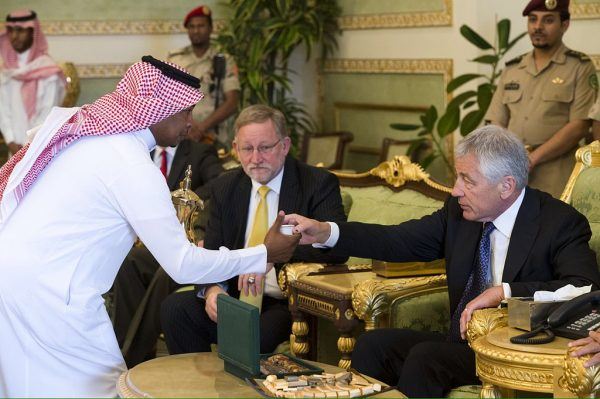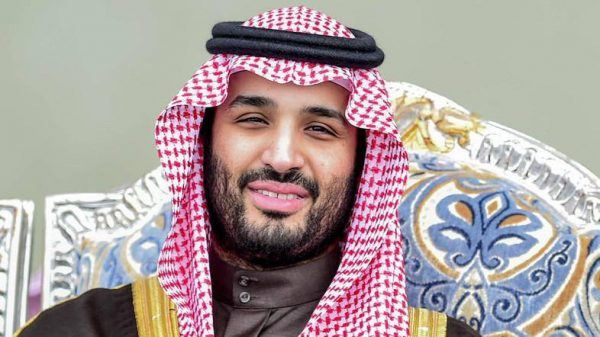This week, Crown Prince Mohammad bin Salman of Saudi Arabia is in the United States to meet with President Donald Trump. While many Saudi diplomats and officials regularly meet with US counterparts, this particular trip of a royal family member is being touted as special.
For one, the trip will mark 75 years of cooperation between the Middle East oil giant and the United States. The one-of-a-kind relationship between America and the Saudis began when another prince, Faysal bin Abdul-Aziz Al Saud, came to Washington to meet with President Franklin Delano Roosevelt in 1943. Wanting desperately to tap into their massive oil reserves, but fearing the long-term consequences of inviting European colonial powers into their country, the Saudis reached out to the US to provide them with the technical and industrial wherewithal to procure their black gold. At the conclusion of the meeting between Prince Faysal and Roosevelt, the president declared Saudi Arabia “vital to the defense of the United States” as an energy asset, and therefore eligible to receive Lend-Lease aid like other nations fighting the war. This, despite the fact that Saudi Arabia was technically a neutral country.
This event marked the creation of a major factor in Middle East politics. The US-Saudi relationship has influenced important events in the region, one notable example from the modern period being the launching of Operation Desert Storm, which was largely an effort to protect the Saudi kingdom from Iraqi aggression. For years, the US stationed troops on Saudi soil, and to this day, significant American military assets including hundreds of Patriot field units are deployed in the country. These weapons systems continue to play an important role in defending the Saudis from their regional enemies such as Iran and the Houthi rebels in Yemen.

Throughout the relationship between Riyadh and Washington, it is fair to say that there has always been a certain degree of tension between the unlikely partners. This is only natural considering the chasmic gap separating the two nations in both geography and culture. This strain has popped up in a few places across the decades. In the early 1960s, for instance, Saudi Arabia under the rule of King Saud joined the short-lived unified Egypt-Syria in a Soviet supportive alliance. Shortly afterward, the king informed the US that he was refusing to renew the American air base located in the country.
Another crisis came in the early 1970s when the new Saudi king Faisal joined an oil embargo policy, refusing to supply Europe and America with oil as punishment for supporting Israel in the Yom Kippur War. This move triggered a major energy crisis in the US as well as other Western countries. In this context, it is also worth mentioning how Saudi Arabia was considered by many in the US government as a collaborator in the September 11th attacks. In addition to the fact that 15 out of 19 hijackers were Saudi and anti-American sentiment in the country spiked following the attacks, the government in Riyadh was very uncooperative in assisting the US in investigating the perpetrators. Allegations of Saudi collusion in 9/11 was brought back again in 2016 when the government declassified a series of documents known collectively as File 17 describing how the Saudi government delivered support to the hijackers while they were in the US prior to the attacks.
While the US and Saudis have always bounced back following these hiccups that have littered their relationship, the persistent clashes that always seem to come up between the two nations always stem from an inescapable geo-political reality: Saudi Arabia is a Middle Eastern country with Middle Eastern interests, founded on deeply conservative Islamist values. It does not matter how valuable, economically or strategically, their relationship with America is. There has always been a dissidence between US and Saudi interests. This is what moved Saudi Arabia to partner with other Arab nations, despite those countries not being fully in line with the Western agenda. This is what has prompted Riyadh to join the Muslim/Arab coalition against Israel, and of course why there has always been support emanating from the kingdom bolstering global jihadism. This has been the ebb-and-flow trend of US-Saudi relations for the past seven decades
Enter Prince Mohammad.
Ever since the prince’s scandalous power grab and purge of the government four months ago, many observers have come to see Mohammad as a genuine progressive in a traditionally ultra-conservative country. Prince Mohammad’s purge has been perceived to be spearheading a program of major reforms he seeks to implement in the country, including fostering more openness to the outside at the official level.

Prince Mohammad’s actions have spoken pretty loudly. Shortly after the prince’s purge, Salman invited the Maronite Patriarch of Lebanon, Beshara Rai at Al-Yamamah, to Riyadh. This was the first time such a Christian leader visited the Saudi Kingdom. A number of other instances of “loosening restrictions” in areas of culture and the economy also indicate that Prince Mohammad is serious about moving the country in a new direction.
This new direction has also come with reaching out to Israel, albeit in a subtle way. Behind-the-scenes collaboration between Israel and the Saudis is not completely new. For years reports have detailed the meetings between top-ranking Saudi and Israeli security officials, and even signs of their collaboration on regional strategy. This relationship has now become more overt.
The London-based Saudi news outlet Elaph Journal recently published an article containing an interview of IDF chief of staff General Gadi Eizenkot. In his first interview with an Arab outlet, the general spoke about the “Shiite threat” threatening both Israel and the Saudis and that the two countries had “common interest” in addressing the spearhead of that threat, Iran. As this author can attest, it is astounding for any Israeli military serviceman to see the name of their commander in Arabic ( غادي إيزنكوت) written in a positive context.
All of these significant signs of sincere progress form the backdrop for Prince Mohammad’s arrival in Washington. The administration is certainly hopeful. For the first time, it may actually have a genuine reformer—who for all intents and purposes is in charge of the Saudi State—to whom it can address American concerns. And concerns they have.
The big item on the agenda is how the Saudis factor into the US policy on Iran. President Trump has always voiced a rather aggressive stance on Iran, making repeated references to an intent to cancel the Joint Comprehensive Plan of Action (JCPA), the Obama-era nuclear deal with the Islamic state. The recent ouster of Rex Tillerson as secretary of state was in part a move by Trump to bring people on board more in line with his attitude. Trump wants to get an idea about how the Saudis will respond to the different scenarios that may play out in relation to Iran. Some statements by the Saudis have, not surprisingly, indicated that the kingdom would take a hardline stance against any attempts by Iran to build up arms outside of the JCPA framework.
Prince Mohammad himself stated in a recent interview that despite the fact his country did not want to acquire nuclear weapons, “without a doubt, if Iran developed a nuclear bomb” his country would “follow suit as soon as possible.” The possibility of Saudi Arabia triggering a nuclear arms race in the Middle East is not a happy prospect for anyone in Washington. This is especially true considering the short time frame in which the country could acquire their own atomic weapons. The Saudis are already underway in producing nuclear facilities for energy purposes. In theory, these very facilities could be used for weaponizing missile material if the leadership so decides. Saudi Arabia may not even need to build their own bombs at all. For years, there has been much talk on the possibility of the royal family calling upon their longtime allies in Pakistan to “lend” some of their nuclear warheads.
What President Trump and others are banking on in this meeting with Prince Mohammad is that this time around, America could have a dialogue with a strategic partner who can look beyond his own regional issues. The United States shares many concerns of the Saudis, from Iran to the civil war in Yemen and the more general spread of jihadism in the region. The makers of US foreign policy need to know that they can rely on a stable, working partner.
















